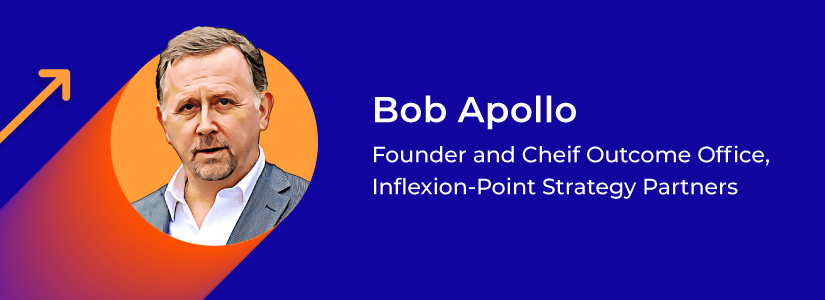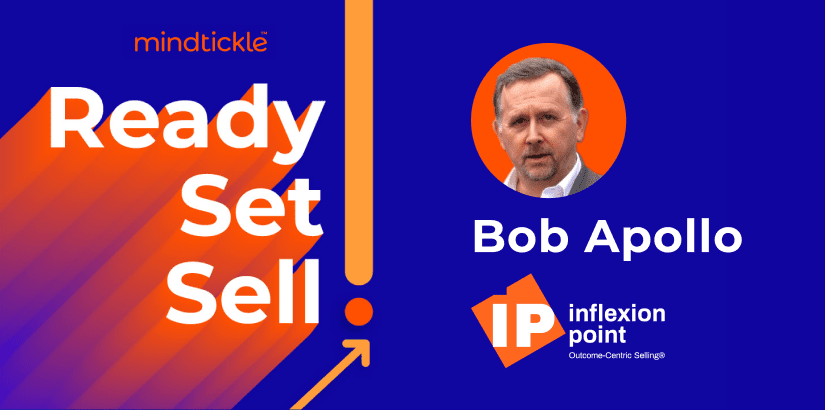Mindtickle is on the airwaves! We recently launched a new podcast called Ready, Set, Sell, where we’ll regularly sit down with industry thought leaders to provide listeners with smart insights, tangible advice, and actionable tips they can apply to the work they do in their own roles. It’s co-hosted by Hannah Ajikawo, Practice Lead at Skaled Consulting, and Tony Germinario, Director of Sales at Mindtickle, and in our first episode, they sat down with Bob Apollo, Founder and Chief Outcomes Officer of Inflexion-Point Strategy Partners.
In case you missed it, not to worry. We’ve got a recap of the podcast below, covering major themes such as:
- Tips, tricks, and selling secrets for outcome-centric selling
- Creating unique selling propositions
- How to build trust, and why it matters
- Becoming a future-focused seller
- What sales leaders should prioritize
- Rapid-fire questions
Who is Bob: Apollo?

Tony: Can you tell us a little bit about your background?
Bob: I’m working with a bunch of very interesting scale-up and entrepreneurial units of larger organizations, helping them put a new slant on their business-to-business selling, with particular emphasis on the complex sales process. I’ve been involved in B2B sales of technology-related products and services. And that career has spanned start-ups, scale-ups, and corporates. My sweet spot is really in scaling up start-ups and turning them into a sort of reliable growing revenue generation machine.
Tony: So what really drew you to the world of sales initially?
Bob: One of the things about selling is, unlike many other careers, you have a very, very clear measure of whether you’ve succeeded or failed. So that’s part of it and certainly, in the world of complex selling, it’s a world of interaction with people. The challenge and the joy of interacting with prospective and existing customers is a big part of the motivation.
Let’s talk about the future of sales.
Sales futurist really positions the commentary as not looking backward, but anticipating where the world of selling is going and helping salespeople who have a desire to improve themselves and learn new ways of thinking.
Hannah: You’ve got a wealth of experience and I love the fact that you’ve noticed your sweet spot really being in that start-up/scale-up space. If you think about the big picture, what is the impact you want to make on the sales community overall?
Bob: I think it’s very simple. It’s to help others achieve their potential. Whether it’s at an individual level or at an organizational level.
Hannah: I love that. There are so many individuals now that have named themselves sales experts, but you really are based on your experience. I’m quite keen to transition into the term sales futurist and what that actually means to you. And more specifically, Bob: why should more salespeople adopt this type of approach?
Bob: Top Sales World created the label sales futurist really to position the commentary as not looking backward but anticipating where the world of selling is going and helping salespeople who have a desire to improve themselves and learn new ways of thinking. So I’m not talking about, you know, the world of selling is going to be immediately overrun by artificial intelligence. I’m still thinking about the role of well-informed, skillful individuals helping to shape sales as a positive profession.
Tony: I think sales futurist has meant more than ever over the last two years, no one could have ever anticipated what we’ve been through and what salespeople, in general, have had to deal with going through the pandemic. So from what you’ve seen, how has the customer experience really evolved over the last six months or so? What are some of the factors that might be making it more complex than what has been in the past?
Bob: The pandemic has accelerated things that were probably in play already. We already observed more stakeholders and decision-makers being involved in complex buying journeys. We observed a desire to consume information in the most practical and effective form, not just relying on the salesperson, not just relying on the internet, but wanting to be able to make sense of the overwhelming amount of information that’s out there. And in fact, I think it’s interesting to note that one of Gartner’s main themes about the evolving world of selling is this concept of the salesperson, the sense maker, to help the customer make sense of the world that they’re in to try and strip out some of the complexity. And I think if I observe one thing, it’s really shown who within the sales community is really adaptable and has a personal desire for continuous development.
Tony: I think you’re absolutely right about the evolving world of selling. It really has evolved from product to solution, and now it seems like there’s a lot more around outcome-centric selling. At least the people that are really getting ahead of the game at this point. So why do you think that shift is really imperative for modern sales organizations?
Bob: I think that shift is really important because if the customer is making a significant buying decision, they’re doing it because they want to achieve a better business outcome rather than because they want to buy your solution. Your solution is just a tool to enable them to achieve a better outcome.
So we need to really think as salespeople about a buying journey that only ends when the customer’s outcomes have been achieved, rather than a sale that appears to be complete when an order is taken.
Hannah: I love what Bob said about your strongest competitor being the status quo.
Tony: I think it’s human nature to stick to what’s comfortable. People tend to believe it’s easier to deal with challenges you’re already familiar with rather than launch headfirst into something new.
Hannah: I completely agree. It’s the role of the salesperson to build confidence in the customer and help them to see the value in making a change. This will ultimately require proving to the customer that they can trust you to add value to their day-to-day life.
Tips, tricks, and selling secrets for outcome-centric selling
Tony: Like any other personal or professional relationship, success really comes down to building a strong foundation of trust. Given his expertise and lengthy experience, I think Bob: really has an intimate awareness of this concept.
Hannah: I loved that point about the experience not ending when your sales process ends and more about being really focused on the customer’s received outcome. What would you say are some of the main principles of that approach of an outcome-centric selling approach?
What happens if the customer doesn’t know what outcome they’re trying to achieve?
Bob: You have to work backward from what the customer is trying to achieve. I actually did a broadcast last week where the question was asked, “What happens if the customer doesn’t know what outcome they’re trying to achieve”? If a prospective customer cannot articulate the business outcome they are trying to accomplish, they’re much less likely to get the project approved. I think there’s a sort of correlation that says more junior buyers tend to think in terms of features and functions and it’s the more senior executives, the ones that have to actually sign off any significant purchase who think in terms of this is an investment in achieving an outcome. So if you can’t have a conversation about outcomes, I think it’s sometimes an indication you’re actually not very well placed in the decision-making process because if this is a significant purchase, then your apparent champion is going to have to defend and justify that purchase internally to the approval group. So it’s not really if you can your solution approved, it’s to do with getting the project approved. If you’re the salesperson that has an outcome-oriented conversation and everybody else is talking about features, functions, and so-called solutions, you’re in a lot better place.
Hannah: You gave an example of a salesperson possibly not being high enough in a decision-making tree, right? So you’ve got a prospective buyer and they’re saying, “I need a customer data platform.” The junior salesperson starts to go through the process and then things start to go quiet. What kind of things can salespeople do, particularly in this day and age, to help move higher in that food chain when it comes to decision making so they can start to piece together what a real outcome is, a tangible outcome for a business?
Bob: Somebody very smart long ago told me that you end up talking to the person you sound like. So if your sales conversation is about features and functions and so on, you’re going to end up talking to somebody who’s interested in features and functions. And if you do turn out to accidentally be talking to somebody senior and you have a dialogue with them around features and functions, that dialogue is not going to last long, right? You’re going to get delegated down or thrown out.
What any salesperson can do is understand the business issues that companies come to your organization wanting to solve. Understand the outcomes that you were able to help other similar organizations achieve so that you can become more confident in having a value story with the customer.
Hannah: I completely agree with you. When speaking and working with salespeople I’m always surprised at the lack of interaction that they have with the customer success team. There’s never been an introduction, there’s never been a meeting just to find out what are those value stories. So to make your job much easier, I really love that piece of advice.
Bob: I think any organization delivering solutions as a service has realized the critical importance of customer success teams. But I’d say even then, there’s a wide range of perspectives about the role of customer success. It’s about making sure that you fix any issues that the customer’s having, that you respond quickly and you make sure their uptime is high and their usage is high. However, I think the best customer success teams also in addition to operational excellence, seek to understand and reinforce the value that the organization is achieving through the use of your solutions. The first time you have that value conversation is when you’re asking them to renew and it’s way harder than if you’ve been having a dialogue about business value delivered throughout the relationship.
Creating unique selling propositions
Tony: I feel that should be part of the entire process, it starts from the salesperson because they need to establish that upfront, and then the customer success team just really follow through with that. So you’re absolutely right. Just to pivot slightly, I read something that you had posted recently, I’ve been doing sales longer than I care to admit, and I’ve run into many salespeople over the years that tend to use that same process, no matter what type of organization or type of company that they’re working with. You recently wrote a blog about unique selling propositions and how they can be enough maybe to close a sale in a B2C type business, but it’s is not really the same for a B2B business. Why do you see that? And what more can B2B businesses be doing to close the sale? Or what can you be doing in those sorts of scenarios?
Bob: I think the classic unique value proposition or however you label it can work in relatively simple, straightforward sales where there’s little variation in the buying environment from one customer to another. But if you’re trying to sell change to an organization, that story has to be tailored to the reason why that organization needs to change.
- Why should they change rather than carry on their current path?
- Why should they choose you rather than any of the other options?
- Why should they act now rather than later?
- Who is going to benefit from implementing your approach and how?
Those things can’t be cookie cutter. You have to tailor them to the conversations you’ve been having with the customer, this will help you discover the unique answers to those four questions. It’s as much about justifying change as it is justifying your particular approach to that change. But if you are the salesperson that most influences that value journey, that specific buying justification, you have put yourself in a far better place than salespeople who only think about why the customer should buy their solution.
How to build trust, and why it matters
Tony: And I think one of the ways that you really help justify is by establishing that level of trust with the client. So what would you say about the role of trust in the sales process? And do you think it’s more crucial today in the environment that we’re in than it’s ever been before?
Bob: I think that trust operates at a number of levels. It’s trust in the individuals I’m interacting with because they represent the likely interactions I’m going to have with their colleagues. It’s trust in the solution that is going to deliver, the results of the outcomes that I’m expecting. It’s trust in the organization I’m about to do business with, in their viability, and in their approach to partnering with customers. So trust isn’t just at one level. I think it’s established. Another part of Gartner’s recent research suggested that one of the reasons that prevented business buying decisions was a lack of decision confidence.
And again, I think that decision confidence is intimately connected with trust. Do I trust the salesperson? Do I trust the solution being proposed will work as it’s defined? Do I trust the company I’m about to do business with? Do I trust the collective experiences of all of the other customers this organization has dealt with can be applied to my benefit so that I can be confident that I’m making the right decision?
Because I think the default is where decision confidence isn’t established that the customer decides to stick with the status quo. And in many ways in a complex discretionary purchase, your strongest competitor is almost always the status quo.
Becoming a future-focused seller
Hannah: What kind of things should salespeople be thinking about to become more future-focused? What sort of skills should they should be trying to improve and work on?
Bob: It starts with a mindset, some of the advice I give to the clients is if they’re recruiting, they need to recruit people who come into their organization with the mindset that says, “I need to be in a mode of continuous learning.” So a lot of that curiosity and humility. What’s going through their minds? How could I, as a sales professional, help them make the case to achieve what they’re looking for?
Hannah: I love that, just the two words “curiosity” and “humility.” You don’t often hear people refer to humility where it’s OK not to know everything. In fact, that’s great because it forces you to go out and develop some ideas about what you actually need to find out. I feel like the last two years have almost forced salespeople to switch their mindsets because everybody didn’t know what to do. There were definitely a few months where everybody was just improvising. Just do what you can, think outside of the box, and try to make things work in a scenario of extreme uncertainty. So a lot of people have been doing things that they haven’t had to do before because they didn’t have the support of their company. Do you think that these last two years have really helped to start to shift the mindset of salespeople who may have been relying on “my company will get me there?”
Bob: I think it’s been almost Darwinian – survival of the fittest or the survival of the most adaptable. I think the last two years have actually permanently damaged the careers of salespeople who had gotten away with not having to be creative, curious, or humble.
One thing that distinguishes really effective sales organizations is the ones that can gather up the learnings that the smartest salespeople have accumulated and recycle that learning in a way that’s applicable to the other members of the sales organization. That way you have an internal of understanding what works and reinforcing it.
Hannah: That moves perfectly into something we try to live and breathe at Skaled. We have this philosophy, when we work with organizations, don’t be a professional visitor. So you don’t just turn up, say lots of fancy things, and leave. You really have to create change. You have to help them to move the needle. Just on your experience of working with smaller companies and large global organizations, what have you noticed about the way in which smaller companies tend to approach sales in comparison to the larger ones?
Bob: That’s a really interesting question because I have seen larger organizations, particularly the entrepreneurial divisions of larger organizations, be effective in this regard. But I do think many of the scale-ups need to work out where growth is going to come from, what you need to do to adapt, et cetera.
It comes down to a management philosophy of not just thinking about the quantity of action that their salespeople are undertaking, but the quality of the action. Instead of saying, “You have to make 100 calls a day,” instead say, “You need to be able to advance X number of opportunities in a meaningful way. Now, with the help of your manager and your colleagues, let’s work together to see how we cannot maximize the inputs or the activities but maximize the output.”
Tony: I think we’ve seen a lot of that, especially over the last two years here, where management is trying to set a certain path and it’s trickling down through the sales organization. As much as people have tried to pivot, there is still seem to be, in some cases, these underlying themes that are still out there or that are a little bit older school. In that regard, are there any common myths or misconceptions that we need to get beyond? What would you say those things are?
Bob: There’s one, in particular, I’ve hammered on. It’s the statement, that the average buyer is 57 percent of the way through the buying process before they want or need to talk to a salesperson. As an average and without any context, it might have been accurate, but the truth of the matter is if I’m a buyer who knows what they want to buy, why would I want to talk to a salesperson? They might find it far more convenient to have an entirely web-based buying experience. But if I’m an inexperienced buyer, this is the first time I’ve tried to solve this sort of problem.
I think there are profound reasons why if the salesperson is positioned as somebody who can educate rather than pitch, they’d want to learn from that. If you think about desirable and undesirable behaviors, I want to persuade them to engage me way before 57 percent of their buying journey. I want them to think that if they do choose to speak to me, they’ll learn something of value and that they’ll emerge from the conversation feeling smarter.
Tony: And that’s where that trust level comes in as well, right? Because if someone can be educated in a conversation, that’s where your trust really is built upon – you’re getting that foundation.
Bob: If the potential buyer emerges from that interaction thinking that was time well spent, they learned something valuable rather than they couldn’t wait to get off the call.
What sales leaders should prioritize
Hannah: I think everybody can relate to that. And that’s an important part of what you’re talking about when you’re saying, how can salespeople be educators rather than just trying to sell their solution. So this is really an important part of your whole discussion around salespeople being educators rather than trying to force their solutions onto these poor buyers. What other things would you say that sales leaders should be prioritizing to make sure that their sales team is actually ready when they’re in front of prospective buyers?
Bob: The very short answer to that is to equip salespeople to think like a customer, to understand what’s going through the customer’s mind more broadly. I think it’s sort of developing a commercial empathy and an ability to talk in those commercially empathetic terms with buyers. You know, a significant part of their training needs to be not teaching the salespeople the features and functions of the latest release of the latest product but to identify the business issues this particular offering was designed to address and how to have a dialogue with a potential customer around those issues. So what would happen if you didn’t do anything about this? That question is always struck me as being one of the most important things.
Hannah: And you’ll also find some customers who will say something like, “hmm, haven’t really thought about that yet.” How do you position the follow-up?
Bob: You need to recognize that this is a substantial decision requiring a significant investment of money, time, etc. It’s almost always going to be competing against other projects that the customer might also be thinking about committing to at the time.


Tony: What is your sales philosophy in just three words?
Bob: Always create value.
Tony: What is the best piece of advice you’ve been given in your career?
Bob: Take responsibility.
Hannah: What’s your top productivity hack?
Bob: Focus. Prioritize. Execute.
Hannah: Looking into 2022, what’s your top prediction for the sales industry this year?
Bob: That smart sales organizations will continue to drive towards thinking about outcomes rather than so-called solutions.
Tony: What’s one thing or perhaps one person that you believe has really been revolutionizing the sales industry?
Bob: I don’t think it’s any one person. There are a bunch of people that I’m inspired by, and I hope to continue to be inspired by. The thing that’s revolutionizing complex B2B sales is this emergence of hybrid selling because of the mixture of face-to-face and virtual, the use of automated information sources, and blending them all together.
Hannah: If you could share just one piece of advice to all salespeople, something that they could do on their next call or in their next meeting, what would that be?
Bob: Don’t make excuses. Hold yourself accountable for your actions. Say things that the customer needs to hear rather than what you think they’d like to hear.
What we learned
We learned the importance of building a strong foundation of trust with customers by considering the entire customer journey and final business outcomes. This is what outcome-centric selling is really all about: creating a culture of continuous learning within sales organizations – curiosity, humility and self-awareness will take you far in the sales industry. At the end of the day, sales is mostly having a willingness to stay open and adaptable to change. We hope you took away some valuable lessons and insights that inspire you to reevaluate your approach to sales readiness. Don’t forget to subscribe, rate, and review the show when you get a minute, and stay tuned for the next episode of Ready Set Sell.
Learn more and subscribe to Ready, Set, Sell here.







